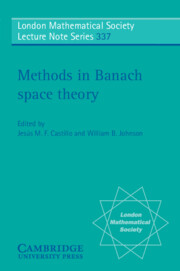Book contents
- Frontmatter
- Contents
- Preface
- Acknowledgements
- Picture: closing at the main lecture room
- 1 GEOMETRICAL METHODS
- 2 HOMOLOGICAL METHODS
- Yet another proof of Sobczyk's theorem
- The category of exact sequences of Banach spaces
- Extension problems for C(K) spaces and twisted sums
- Palamodov's questions from Homological methods in the theory of locally convex spaces
- 3 TOPOLOGICAL METHODS
- 4 OPERATOR THEORY METHODS
- 5 FUNCTION SPACE METHODS
- List of participants
- Picture: some like it fun
Extension problems for C(K) spaces and twisted sums
Published online by Cambridge University Press: 04 May 2010
- Frontmatter
- Contents
- Preface
- Acknowledgements
- Picture: closing at the main lecture room
- 1 GEOMETRICAL METHODS
- 2 HOMOLOGICAL METHODS
- Yet another proof of Sobczyk's theorem
- The category of exact sequences of Banach spaces
- Extension problems for C(K) spaces and twisted sums
- Palamodov's questions from Homological methods in the theory of locally convex spaces
- 3 TOPOLOGICAL METHODS
- 4 OPERATOR THEORY METHODS
- 5 FUNCTION SPACE METHODS
- List of participants
- Picture: some like it fun
Summary
INTRODUCTION
This article can be regarded as an update on the handbook article by Zippin [27]. In this article Zippin drew attention to problems surrounding extensions of linear operators with values in C(K)-spaces. The literature on this subject may be said to start with the work of Nachbin, Goodner and Kelley on the case when K is extremally disconnected around 1950. Thus the subject is over fifty years old, but it still seems that comparatively little is known in the general case. We are particularly interested in extending operators on separable Banach spaces when we can assume the range is C(K) for K a compact metric space. In this article we will sketch some recent progress on these problems.
LINEAR EXTENSION PROBLEMS
It is, by now, a very classical result that a Banach space X is 1-injective if and only if X is isometric to a space C(K) where K is extremally discon- nected; this is due to Nachbin, Goodner and Kelley [22], [11] and [17]. For a general compact Hausdorff space K the space C(K) is usually not injective (and, in particular, never if K is metrizable). However it is a rather interesting question to determine conditions when linear operators into arbitrary C(K)-spaces can be extended. This problem was first considered in depth by Lindenstrauss in 1964 [18].
Let us introduce some notation. Suppose X is a Banach space and E is a closed subspace. Then, for λ ≥ 1; we will say that the pair (E;X) has the (λ, C)-extension property if whenever T0 : E → C(K) is a bounded operator then there is an extension T : X → C(K) with ||T|| ≤ λ ||T0||.
- Type
- Chapter
- Information
- Methods in Banach Space Theory , pp. 159 - 168Publisher: Cambridge University PressPrint publication year: 2006
- 1
- Cited by



